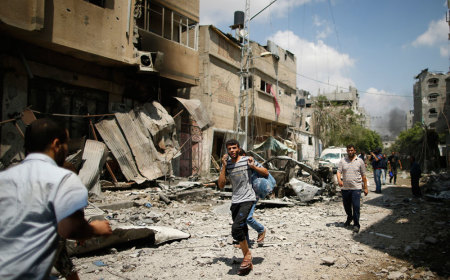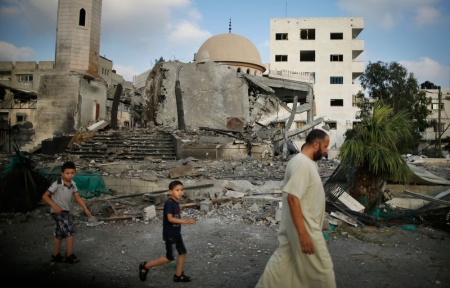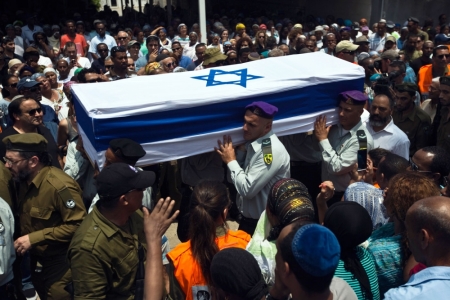Christian Leaders in Gaza, Israel Reject Blame Game But Explain Hard Reality on the Ground (Interview)

Christian leaders in Gaza and Israel are urging a ceasefire between the militaries of Israel and Hamas, explaining the situation on the ground from their perspective but rejecting the habit of laying blame on one side for the ongoing conflict between Israel and Hamas.
Dr. Munir S. Kakish, Chairman Council of Local Evangelical Churches in the Holy Land, told The Christian Post in an email interview on Monday that "one piece of information often not known is that there are Christians in Palestine, Gaza and the West Bank. There have been Christian Arabs here since the time of Jesus," he pointed out.
Israel and Hamas have been engaged in a violent conflict stretching over two-weeks now, with rockets being fired from both sides. Palestinian casualties have reached over 500, with thousands more injured, after the Israel government ordered a ground invasion into Gaza, targeting terrorist tunnels and other sites it said are a direct threat to the Israeli people.

While Hamas rejected an Egyptian-brokered ceasefire proposal last week, which led to the ground invasion, Kakish clarified that the militant group does want a ceasefire, but needs certain terms to be met.
"They want a meaningful ceasefire to end the seven years of blockade and travel restrictions that make Gaza one large prison. They want a deal to make life livable," he asserted. "The West did not address the problems in the Gaza strip. The blockade, travel restrictions, economic disaster, lack of any healthcare have all created a condition where life is not acceptable."
At the same time, he added, Israel "wants to make sure her southern borders are safe with no more rockets being thrown at them."
Kakish said that as long as both Israel and Palestine continue to stake claim over disputed territories without compromise, peace cannot be achieved.
"As long as Palestinians want all of the 1967 borders, there will be no peace," Kakish said, referring to the Six Day War of 1967 when Israel captured the Gaza strip and the West Bank.
"As long as Israel feels Judea and Samaria is their homeland without respect to the inhabitants that have lived there for thousands of years, there will be no peace," he added.
The Evangelical leader said that both sides blame each other for the conflict, but Palestinians in Gaza especially see no future as long as the status quo remains.
Although a number of protests have been held in major cities, including London and Paris, over Israel's ground invasion, Israeli Prime Minister Benjamin Netanyahu insists that Hamas is to blame for putting Palestinian civilians in the crossfire and using them as human shields.

"We're sad for every civilian casualty. They're not intended. This is the difference between us. The Hamas deliberately targets civilians and deliberately hides behind civilians. They embed their rocketeers, their rocket caches, their - their other weaponry from where - which they fire - which they use to fire on us in civilian areas," Netanyahu said on Sunday.
Several other Evangelical church leaders in Jerusalem have called for Christians around the world to join together in prayer for the people trapped in the violent conflict.
"Let us avoid entering the trap of the blame game, but rather, admitting that we are ALL sinners saved by grace and without Him we are destined to return to this same table of accusatory negotiations," said Pastor Charles Kopp, Chairman of Evangelical Alliance – Israel.
"It is imperative we remember that our first allegiance and citizenship is from above and that we cannot use the Bible selectively to defend the cause with which we identify," Kopp continued.
"We need to come out of this latest round of death and destruction and agree to place this quagmire of despair behind us and transcend these latest attempts to assassinate what is left of our brotherhood in Christ by loving one another more fervently. Then, and only then, will we be able to demonstrate a difference that the world would envy."
The Rev. Harry Tees, World Evangelical Alliance Ambassador to the Holy Land, said that evangelicals in the Middle East are saddened by the "spiral of violence" that is ripping through the neighborhoods.
"As believers in Jesus we beseech God the almighty to have mercy on our lands. We call the worldwide Church to join us for a time of prayer and fasting. We have much to repent of ourselves – the attitudes of blame and accusation. Yes, we are wronged but we have Jesus example of forgiveness and cannot separate us from His spirit for He is Humble and Meek," he said.
As for efforts that Evangelical churches in Jerusalem are leading, Kakish told CP that they have been helping needy families by supplying them with food, medical needs, and providing finances to buy necessities. He noted that the unemployment rate in the West Bank is around 21 percent, while in Gaza it is over 40 percent.
Christians also operate schools, hospitals, clinics, and reach out to people with "love and action," he said.
Kakish added that a growing threat to the stability of the entire region, and especially for Christians, is the militant group ISIS, which has been active in Iraq and Syria, driving Christians away with "convert or die" ultimatums and declaring an "Islamic State" on the territory.
"Never in the history of mankind has a group of radical Muslims announced the genocide of all Christians in all the Middle East countries," Kakish explained.
He added that the Islamic radicals are another reason there will be no peace in the region, but urged Europe and Western powers to apply "serious pressure" to try and bring Israel and Hamas to end the conflict.
Some Christian organizations, such as Musalaha Ministry of Reconciliation, have made it their mission to bring Israelis and Palestinians together, address the numerous complicated issues standing in the way of peace, and help end the conflict.
"It is our vision and hope that in listening to one another, in understanding each other's backgrounds and identity, in seeking forgiveness and to forgive, Palestinians and Israelis will build relationships that reflect their faith and bring glory to God and peace to this Land," the group says on its website, headed by its director, Salim J. Munayer, a Palestinian-Israeli.





















